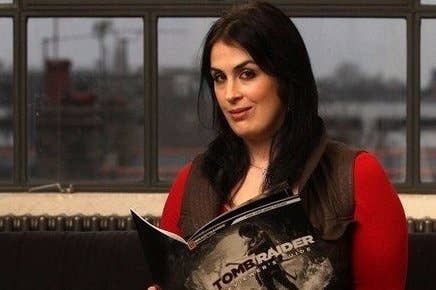Pratchett pushes the importance of story
"We are storytelling creatures and we look for the narrative in everything"
At her DICE talk today scriptwriter, story designer and "narrative paramedic" Rhianna Pratchett made sure that the audience was left in no doubt about the importance of strong story and writing when it comes to creating a quality game.
"Over time in the industry a lot has changed in games, so there's now a focus on narrative that was never their before," she explained.
"There were obviously people doing narrative but they were sort of in dark rooms and they were never allowed out to talk about the craft or to do this kind of thing. Now there are awards for video game writing like the WGA and BAFTAs and conferences like the narrative GDC Summit, there are game workshops popping all over the world."
"Gameplay might engage the mind but it's story that engages the heart"
Rhianna herself has worked on games like Bioshock Infinite, Heavenly Sword, the Overlord franchise, Mirror's Edge and of course the recent Tomb Raider titles. She's also won a number of awards, most recently the Writers Guild of America's "Outstanding Achievement in Video Game Writing" for Rise Of The Tomb Raider.
"We are storytelling creatures and we look for the narrative in everything," she continued.
"Even if you're not purposefully putting much narrative in players are going to be looking for that story anyway, we're humans, we connect to story and we connect to those experiences. Gameplay might engage the mind but it's story that engages the heart."
She said story could take players beyond just understanding the mechanics of a game and make them care about the experience, motivating them to continue through frustrating moments of gameplay. Pratchett said narrative could also make your games stand out in a busy marketplace, and used Telltale Games as an example.
"Before they worked on The Walking Dead they were a sort of mid-level indie developer and producing solid but not that well known games. Then they decided to really fully embrace narrative, story telling, character and they gave us franchises like The Walking Dead, my personal favourite The Wolf Among Us, Borderlands, Game Of Thrones, and they soared in recognition and popularity. Everyone has heard of them now and they took over the episodic narrative space, all because they were focus on story and character."
She likened this to her reboot of Tomb Raider in 2013, focusing on the character and story of Lara Craft and making her journey central to the experience. She notes it went on to becoming the fastest selling game in the franchise's long history.
She also looked at the how the role of writers had changed within the industry:
"Writing was normally done by designers or producers or literally anyone that fancied a go or anyone that was thought to be able to put words together in a pleasing order," she said.
She noted the period, eight or nine years ago when the industry became obsessed with using film writers to try and bring Hollywood glamour to games, with disappointing results. She suggested we could look to film and TV, theatre and particularly interactive theatre and learn from them, but also that games had their own special qualities that must be taken into account.
"We really have to recognise our own uniqueness and our own power and how that can transcend into what we're doing in narrative. Games are not a passive medium, you're not sitting there and absorbing the story in the way that you are in film and TV. You're in the story. It's all around you. You are the story."
"We really have to recognise our own uniqueness and our own power and how that can transcend into what we're doing in narrative"
Pratchett went on to explain that the industry needed to start fostering its own talent in this area, involving professional writers from the early stages of development and making the writer part of the development team.
"Narrative really benefits when writers are fully integrated in the team," she said, using her own experience with Overlord as an example. She worked closely with level designers every day to make sure the story, gameplay and world worked together. She also directed narrative on the titles, which gave the game a more cohesive feel.
"Narrative definitely benefits when the writers are allowed to do more than just the word bits and can get involved with everything else," she said.
"Not to sound too schmaltzy but we are in this together, writers need to help to engage the team in the rest of the story. Story flows through everything in a game, story is not just the word bits, story is the gameplay, is the animation, is the mechanics, is the art, is the music. Everything should and can support the story and writers should be at the forefront of championing this."

